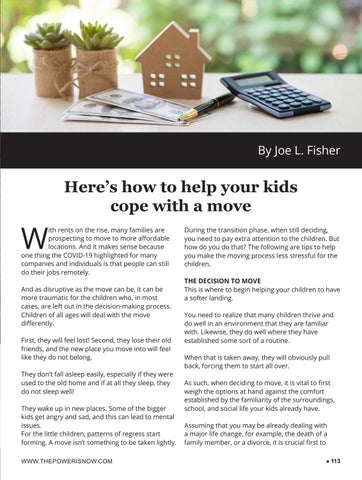By Joe L. Fisher
Here’s how to help your kids cope with a move
W
ith rents on the rise, many families are prospecting to move to more affordable locations. And it makes sense because one thing the COVID-19 highlighted for many companies and individuals is that people can still do their jobs remotely. And as disruptive as the move can be, it can be more traumatic for the children who, in most cases, are left out in the decision-making process. Children of all ages will deal with the move differently. First, they will feel lost! Second, they lose their old friends, and the new place you move into will feel like they do not belong. They don’t fall asleep easily, especially if they were used to the old home and if at all they sleep, they do not sleep well! They wake up in new places. Some of the bigger kids get angry and sad, and this can lead to mental issues. For the little children, patterns of regress start forming. A move isn’t something to be taken lightly. WWW.THEPOWERISNOW.COM
During the transition phase, when still deciding, you need to pay extra attention to the children. But how do you do that? The following are tips to help you make the moving process less stressful for the children. THE DECISION TO MOVE This is where to begin helping your children to have a softer landing. You need to realize that many children thrive and do well in an environment that they are familiar with. Likewise, they do well where they have established some sort of a routine. When that is taken away, they will obviously pull back, forcing them to start all over. As such, when deciding to move, it is vital to first weigh the options at hand against the comfort established by the familiarity of the surroundings, school, and social life your kids already have. Assuming that you may be already dealing with a major life change, for example, the death of a family member, or a divorce, it is crucial first to l
113




































